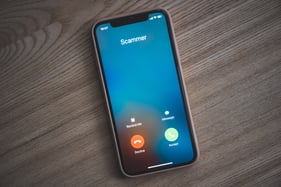
Criminals can be very clever, spoofing an email that is very similar to something you receive from Freedom First. Take note of the types of content we may communicate via email, as well as note that we will never request you to confirm personal information via an email. We will never contact a member by email or phone requesting you to provide us with your account information or other personal data. Never share your personal username, password, PIN, or account number in unsecured emails or other communications.
4 Tips to Identify a Scam
- Scammers pretend to be from an organization you know.
- Scammers say there’s a problem or a prize.
- Scammers pressure you to act immediately.
- Scammers tell you to pay in a specific way.
Tips to protect yourself
- Don’t give your personal or financial information in response to a request that you didn’t expect.
- Resist the pressure to act immediately.
- Never pay someone who insists you pay with a gift card or by using a money transfer service.
- Stop and talk to someone you trust or call 911!
IRS Imposter Scams
Here’s how they work:
You get a call from someone who says she’s from the IRS. She says that you owe back taxes. She threatens to sue you, arrest or deport you, or revoke your license if you don’t pay right away. She tells you to put money on a prepaid debit card and give her the card numbers.
The caller may know some of your Social Security number. And your caller ID might show a Washington, DC area code. But is it really the IRS calling?
No. The real IRS won’t ask you to pay with prepaid debit cards or wire transfers. They also won’t ask for a credit card over the phone. And when the IRS first contacts you about unpaid taxes, they do it by mail, not by phone. And caller IDs can be fake.
Here’s what you can do:
- Don’t wire money or pay with a prepaid debit card. Once you send it, the money is gone. If you have tax questions, go to irs.gov or call the IRS at 800-829-1040.
- Ass the information on to a friend. You may not have gotten one of these calls, but the chances are you know someone who has.
“You’ve Won” Scams
Here’s how they work:
You get a card, a call, or an email telling you that you won! Maybe it’s a trip or a prize, a lottery or a sweepstakes. The person calling is so excited and can’t wait for you to get your winnings.
But here’s what happens next: they tell you there’s a fee, some taxes, or custom duties to pay. And then they ask for your credit card number or bank account information, or they ask you to wire money.
Either way, you lose money instead of winning it. You don’t ever get that big prize. Instead, you get more requests for money, and more promises that you won big.
Here’s what you can do:
- Keep your money – and your information – to yourself. Never share your financial information with someone who contacts you and claims to need it. And never wire money to anyone who asks you to.
- Pass this information on to a friend. You probably throw away these kinds of scams or hang up when you get these calls. But you probably know someone who could use a friendly reminder.
If you spot a scam, please report it to the Federal Trade Commission.
- Call the FTC at 1-877-FTC-HELP (1-877-382-4357) OR TTY 1-866-653-4261
- Go online: ftc.gov/complaint
Your complaint can help protect other people. By filing a complaint, you can help the FTC’s investigators identify the imposters and stop them before they can get someone’s hard-earned money. It really makes a difference.
Protect your debit and credit cards with custom usage and access settings from the free CardValet® app on your mobile device. Available for Apple and Android. Check this useful Quick Reference Guide to learn more about how to use CardValet®.





